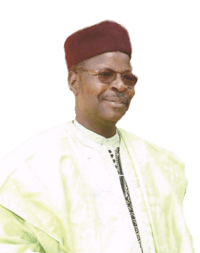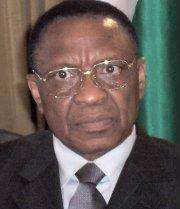1993 Nigerien presidential election
Presidential elections were held in Niger on 27 February 1993, with a second round on 27 March after no candidate passed the 50% barrier in the first round. They were the first multi-candidate presidential elections held in the country since independence in 1960, following constitutional changes approved in a referendum the previous year. Although Mamadou Tandja of the ruling National Movement for the Development of Society (which had emerged as the largest party in the parliamentary elections) won the most votes in the first round, he lost in the second round to Mahamane Ousmane of the Democratic and Social Convention party.[1] Voter turnout was only 32.5% in the first round and 35.2% in the second.[2]
| |||||||||||||||||
| |||||||||||||||||
| |||||||||||||||||
 |
|---|
| This article is part of a series on the politics and government of Niger |
|
| Judiciary |
|
Results
| Candidate | Party | First round | Second round | ||
|---|---|---|---|---|---|
| Votes | % | Votes | % | ||
| Mamadou Tandja | National Movement for the Development of Society | 443,233 | 34.22 | 639,418 | 45.58 |
| Mahamane Ousmane | Democratic and Social Convention | 343,261 | 26.59 | 763,476 | 54.42 |
| Mahamadou Issoufou | Nigerien Party for Democracy and Socialism | 205,707 | 15.92 | ||
| Moumouni Adamou Djermakoye | Nigerien Alliance for Democracy and Progress | 196,949 | 15.24 | ||
| Illa Kané | Union of Democratic and Progressive Patriots | 32,951 | 2.55 | ||
| Oumarou Garba Issoufou | Nigerien Progressive Party – African Democratic Rally | 25,769 | 1.99 | ||
| Omar Katzelma Taya | Party for Socialism and Democracy in Niger | 23,565 | 1.82 | ||
| Djibo Bakary | Sawaba | 21,662 | 1.68 | ||
| Invalid/blank votes | 35,659 | – | 30,499 | – | |
| Total | 1,328,152 | 100 | 1,433,393 | 100 | |
| Registered voters/turnout | 4,082,076 | 32.5 | 4,069,333 | 35.2 | |
| Source: Nohlen et al. | |||||
gollark: You can run any quantum computing stuff on a regular computer. It just might be unusably slow.
gollark: This is done by making it so that they require large amounts of memory (I think this is mostly an issue for FPGAs though?) or basically just general purpose computation (regular CPUs are best at this) or changing the algorithm constantly so ASICs aren't economically viable.
gollark: The ASICs do that very fast. Some currencies are designed so that ASICs are impractical.
gollark: .
gollark: Mining isn't guessing primes, mostly it's just bruteforcing a hash with a particular number of leading zeros
References
- Elections in Djibouti African Elections database
- Nohlen, D, Krennerich, M & Thibaut, B (1999) Elections in Africa: A data handbook, p690 ISBN 0-19-829645-2
This article is issued from Wikipedia. The text is licensed under Creative Commons - Attribution - Sharealike. Additional terms may apply for the media files.

